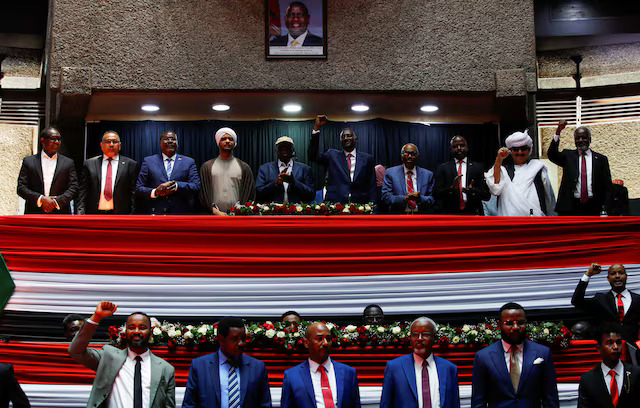Sudan’s Rapid Support Forces signed a charter with allied movements, political and armed groups late on Saturday in Nairobi to establish a government of peace and unity, signatories al-Hadi Idris and Ibrahim al-Mirghani told journalists covering the ceremony.
Among the signatories to the charter is Abdelaziz al-Hilu, a powerful rebel leader who controls vast swathes of territory and troops in South Kordofan state, and who has long demanded that Sudan embrace secularism.
According to the signatories, the charter seeks a new political path and the new government will establish an important political experience that will end the war and achieve stability in Sudan.
After extensive consultations, which resulted in multiple postponements of the signing, leaders from various political and civil forces, armed movements, and the Rapid Support Forces successfully announced the formation of a new government, set to be revealed within the coming days.
The newly formed coalition aims to establish a government with three levels of governance: a Sovereignty Council, a Council of Ministers, and a legislative body that will represent all sectors of the Sudanese population.
The official announcement is expected to take place within Sudan itself.
The charter said the government did not exist to split the country, but rather to unify it and to end the war, tasks it said the army-aligned government operating out of Port Sudan had failed to do.
The conflict has devastated the country, creating an unprecedented humanitarian crisis and driving half the population into hunger, with famine in multiple areas. However, the RSF supports believe the charter will be a new dawn for the country’s growth.
In light of this development, Kenya on Wednesday remained unapologetic for hosting the Rapid Paramilitary Forces (RSF), the group at war with Sudanese Armed Forces for close to two years stating that Nairobi hosting the group was the first step of supporting peace efforts in Sudan and cited its long history in conflict mediation on the continent.
Kenya refuted accusations that it had violated Sudan’s sovereignty, arguing that it was providing a non-partisan platform for affected parties. “When Kenya offers this space, it is without any ulterior motives,” said Musalia Mudavadi, Kenya’s Prime Cabinet Secretary and Cabinet Secretary for Foreign and Diaspora Affairs in a statement.
He said that Kenya remains committed to working with regional bodies, including the African Union (AU) and Intergovernmental Authority on Development (IGAD), to support Sudanese-led efforts toward stability.
He cited the globally acclaimed Machakos Protocol of 2002 that ended the Sudan II civil war, which was concluded in Kenya.
“Kenya has a long history of providing platforms for peace negotiations without taking sides,” he said.
Mudavadi argued that Kenya’s actions were in line with its broader role in peace negotiations and its commitment to supporting Sudan in finding a resolution to its ongoing political crisis.
“We note that this is not the first time groups in Sudan have sought solutions to their crisis by leveraging the good offices of neighbouring countries. Indeed, in January 2024, parties and stakeholders to the Sudanese conflict met in a neighbouring country to chart a way forward on inclusive dialogue and return to civilian rule,” Mudavadi said.
Sudanese armed groups and civil movements have previously met in Juba, as well as Addis Ababa, for discussions that didn’t lead to any deal.
The RSF and its allied movements have gathered in Nairobi since Monday initially to form a government of peace and unity.
RSF Deputy Commander Abdel-Rahim Hamdan Dagalo led the Sudanese delegation at the government-owned Kenyatta International Conference Center in Nairobi, stating a significant announcement would be made on Friday.
“Rapid Support Forces (RSF) and Sudanese civilian groups’ tabling of a roadmap and proposed leadership in Nairobi is compatible with Kenya’s role in peace negotiation, which enjoins her to provide non-partisan platforms to conflict parties to seek resolutions. We continue to offer a non-partisan space for conflicting parties to find common ground and Kenya stands in solidarity with the Sudanese people as they determine their future governance through inclusive discussions,” Mudavadi said.
The government’s stance comes amid increasing regional pressure to find a solution to the Sudanese crisis, which has drawn the attention of the international community.
On Tuesday, Sudan issued a statement saying that Kenya’s move to host the meeting was “tantamount to an act of hostility,” particularly as it preceded a planned announcement of a parallel government by the RSF.
“We extend our thanks to Kenya for hosting and facilitating this meeting. We have now developed a draft constitution, supported by all stakeholders, which outlines a transitional government for Sudan,” RSF said in a statement on Tuesday.
